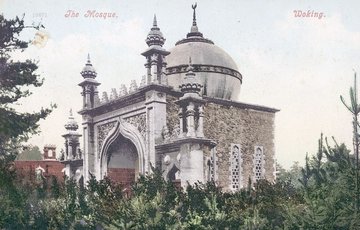
Shah Jahan Mosque, Woking
Britain's first purpose-built mosque in 1889
Other names
Shah Jehan Mosque
Woking Mosque
Woking Mosque and Muslim Mission
Location(s)
Woking
GU22 7AN
United Kingdom
About
The Shah Jahan Mosque at Woking was Britain’s first purpose-built mosque. It was established in 1889 by the Jewish ex-Registrar of the University of Punjab, Gottlieb Leitner, with financial backing from the Begum Shah Jahan of Bhopal. It fell into disuse after Leitner’s death in 1899 but was later resurrected by the Indian lawyer Khwaja Kamaluddin, who established the Woking Muslim Mission in 1912.
The mosque flourished under Kamaluddin’s management and became a hub for Muslims who lived in and visited England. In 1913 Kamaluddin established the mosque’s organ, the Islamic Review, which provides a sense of the mosque and its mission’s activities and approach to Islam. Regular Eid celebrations were held at the Shah Jahan, and Muslim dignitaries from all over the world visited the mosque when in Britain. Photographs printed in the Islamic Review as well as accounts demonstrate the eclecticism of the congregation, which included women and men of a range of nationalities, while articles on numerous subjects suggest the mosque advocated a tolerant and non-sectarian brand of Islam, and sought to accommodate itself to its British context and represent Islam to the British public as compatible with and relevant to their lives. Its success in this respect is suggested by the string of conversions depicted in the Islamic Review. These include some elite British figures such as Lord Headley. Indeed, worshippers were largely from a professional middle-class background, and the mosque retained friendly links with the British establishment, despite its highly controversial allegiance to Turkey and the Ottoman Empire during the First World War.
The Shah Jahan had numerous Imams over the years, as well as frequently hosting visiting preachers. A cemetery nearby on Horsell Common provided burials for Muslims, especially for Muslim soldiers who were killed in the World Wars. After the Second World War, the Shah Jahan lost some of its influence, and other mosques were established, such as the East London Mosque and later the Central London Mosque in Regent’s Park. The mosque remains an active place of worship today.
Eid celebrations
Second World War (burial of Indian Muslim soldiers at Brockwood Cemetery then Horsell Common)
S. M. Abdullah (in charge of the mosque and mission from 1949), Aftab-ud-Din Ahmad (Imam and editor of Islamic Review), Khwaja Nazir Ahmed (Imam and manager/editor of Islamic Review), Syed Ameer Ali (chairman of the committee), Abdullah Yusuf Ali (involved in Woking Mission), Begum Shah Jahan of Bhopal (funded the original mosque), Khwaja Kamuluddin (established the Woking Muslim Mission and first Imam), Muhammad Yakub Khan (Imam and editor of Islamic Review), Mustafa Khan (Imam and editor of Islamic Review), Gottlieb Wilhelm Leitner (established the original mosque), Abdul Majid (Imam), Muhammad Marmaduke Pickthall (edited Islamic Review, preached at the mosque), Sadr-ud-Din (Imam), Hafiz Shaikh Wahba (preached at the mosque).
Lord Headley (convert, worshipped there), Mohammed Ali Jinnah (attended Eid congregations), Abdul Karim (worshipped there), Syedi Mohamedi (trustee), Firoz Khan Noon (attended Eid congregations), William Bashyr Pickard (convert, worshipped there), Khalid Sheldrake, Hassan Suhrawardy (attended Eid congregations).
Anjuman-i-Islam
Islamic Review
Ahmad, Nasir, Eid Sermons at the Shah Jehan Mosque, Woking, England, 1931–1940 (Lahore: Aftab-ud-Din Memorial Benevolent Trust, 2002)
Ally, M. M., ‘History of Muslims in Britain, 1850–1980’, unpublished MA dissertation (University of Birmingham, 1981)
Ansari, Humayun, ‘The Infidel Within’: Muslims in Britain since 1800 (London: Hurst, 2004)
Salamat, Muslim P., A Miracle at Woking: A History of the Shahjahan Mosque (Chichester: Phillimore, 2008)
'Shah Jahan Mosque', Exploring Surrey's Past, Surrey History Centre, https://www.exploringsurreyspast.org.uk/themes/subjects/diversity/shah_jahan_mosque_woking/
Islamic Review, SV 503, British Library, St Pancras
‘Woking – Arrangements with Imam of Mosque at-’, Mss Eur F 143/80, Asian and African Studies Reading Room, British Library, St Pancras
For image and copyright details, please click "More Information" in the Viewer.
Image credit
Postcard of Shah Jahan Mosque, c. 1900, Surrey Postcards Collection, PC/160/ALB1/92. Reproduced by permission of Surrey History Centre.
